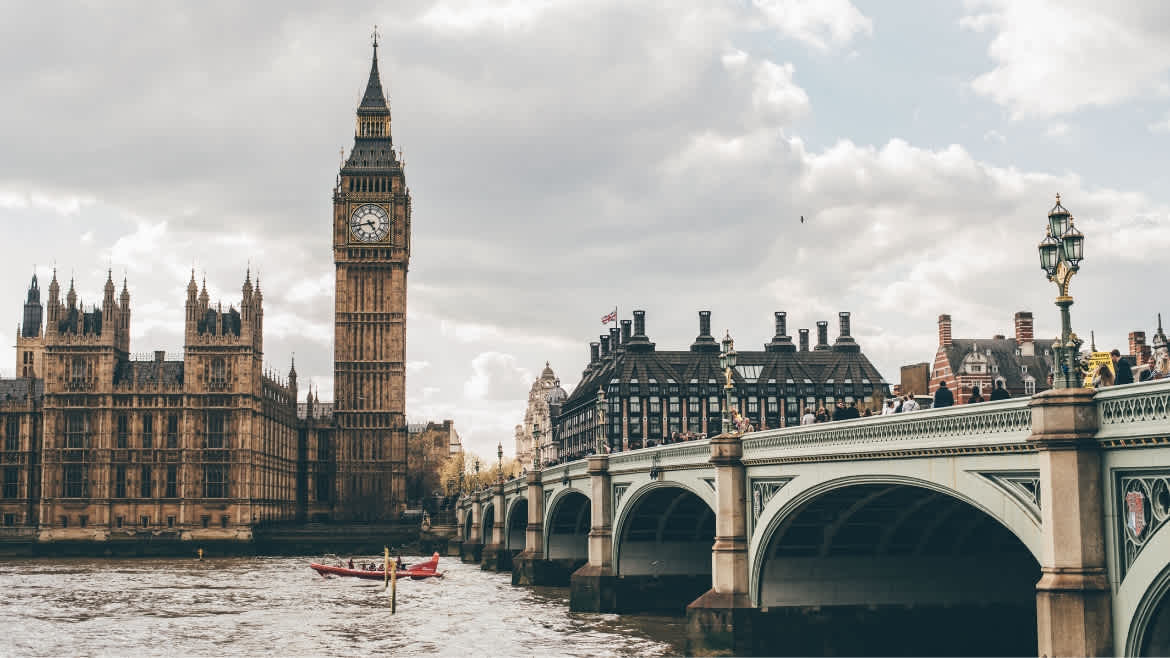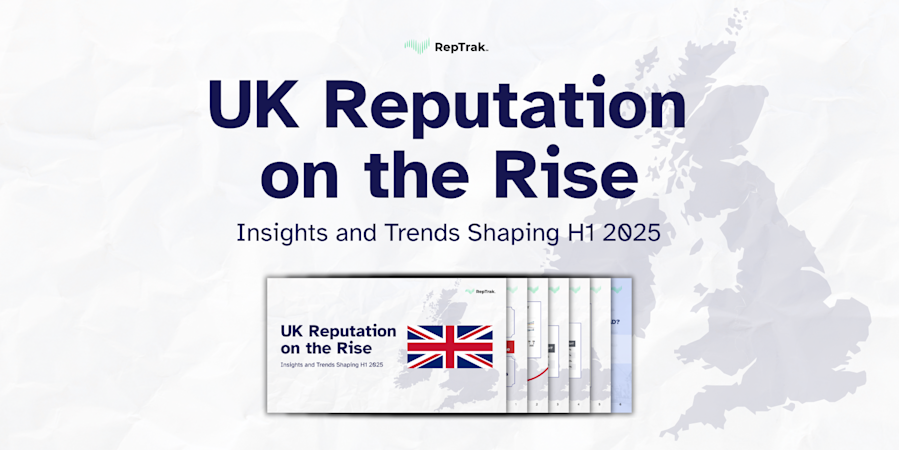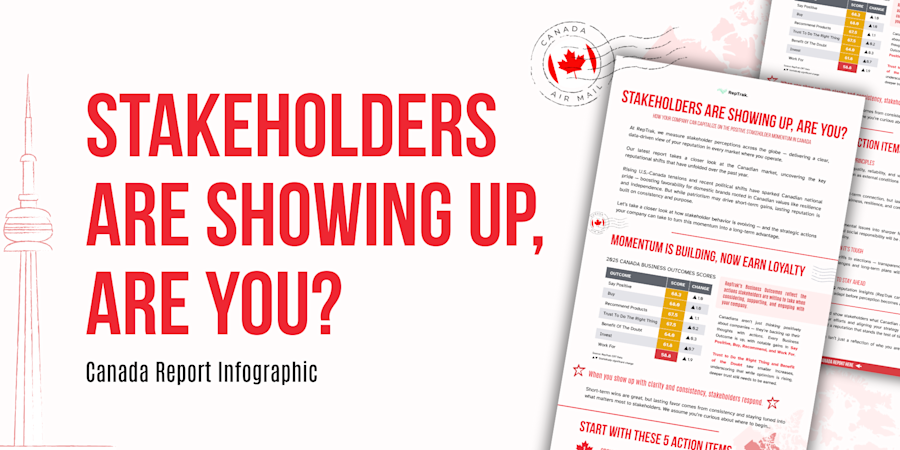2020 U.K. RepTrak Study Reveals Key Learnings About Reputational Stability
Blog Post02 Jun, 2020
Building and maintaining a reputation is not an easy thing for any business to do—in normal times or during a global pandemic, like the one we’re living in now. So it is important for every company to monitor not only their own Reputation Score but the trends that are affecting scores across their country, industry, and the world to know when and how they should institute changes that may lead to improvement.
Case in point: The reputation of the average business in the U.K. has fallen in the last year. This is one of the key learnings from our annual analysis of the reputation of around 500 businesses operating in the U.K., which was conducted in January and February of this year with the input of 7,657 survey respondents from the informed general public.
Reputational excellence
Twenty-four companies achieve RepTrak’s highest accolade—that of excellent reputation—this year in the U.K.
In the country’s Top 10, there is a real diversity in sector and what those businesses do. Companies included range from major food manufacturers like Kellogg’s and Ferrero, to Fintech giant PayPal, and entertainment powerhouse The Walt Disney Company. Many of these businesses can also be found on our global list of the most reputable companies.
“It’s incredibly humbling for us to receive this kind of accolade,” says Chris Silcock, U.K. managing director of Kellogg’s, which earned the title of most reputable company in our 2020 U.K. study. “We’ve been in Britain since 1922, but we know we need to continue to work hard each and every day to earn the right to a place on peoples’ breakfast tables. I’m confident this recognition from RepTrak shows people understand we are a purpose-driven business. It speaks not only to the quality of the food we make but also to our work to tackle hunger through our long-standing breakfast club program and our championing of sustainable food production.”
Those companies in the Top 10 have their origins in the U.S., Europe, and East Asia. One country missing is the U.K. itself. The British public show little preference for domestic businesses, and while some do achieve excellent reputations, none break the Top 10.
Businesses under pressure
That said, while the reputation of businesses overall remains strong—the second highest classification in our Reputation Model—scores have fallen this year. This reverses some of the reputational progress made between 2018 and 2019.
It follows a year of public, political, and media pressure on the behaviour of companies.
The Extinction Rebellion movement of summer 2019 drew attention in the U.K., and beyond, to environmental and sustainability concerns. Discussions of higher purpose became mainstream at Davosand other public forums, with the role of business beyond profits becoming a dominant theme. Even the Financial Times argued that “the long-term health of free enterprise capitalism will depend on delivering profit with purpose.”
As a result of this scrutiny, business in the U.K. has seen weaker performance this year across the most important drivers of reputation, including measures of Governance (ethical, fair, and transparent behaviour) and good corporate Citizenship (environmental responsibility, support for good causes, and positive societal impact).
Sector trends
The technology sector has faced reputation challenges in recent years: accused of spreading “fake news,” enabling extremism and cyber-bulling, and avoiding U.K. tax obligations. But in 2020, we see a sector with an improving reputation, better demonstrating its contributions and value to the U.K. Tech firms see improving reputations this year, with companies like Google, Netflix, and Spotify some of the very best reputation performers.
Global Oil Majors—Royal Dutch Shell, Total, Chevron, and others—are not companies that are commonly thought to be reputation leaders, and while their reputations among U.K. consumers remain average, they are improving as the sector responds to criticism about their contribution to climate change and changes to their business models.
Shell’s CEO Ben van Beurden has acknowledged that the world is not “moving fast enough to tackle climate change” and committed Shell to reducing its carbon emissions by 50% in line with the Paris Agreement. Shell has been rewarded with double-digit reputation improvement in the U.K.
While technology and oil companies improve, the U.K.’s retail sector is a notable for its decrease in score. Following a year of more than 6,000 store closures, business restructures, and job losses on High Streets across the country, the reputation of the sector has fallen significantly. Embattled and downsizing, department store Debenhams leads the sectoral fall.
Growing and protecting reputation in 2020
No business leader started 2020 with a plan for how to respond to a global crisis like COVID-19. Months of working from home, closed shops and warehouses, the need to furlough workers, and the end to international business travel have disrupted every 2020 plan.
While we know that some businesses are faring better reputationally than others during the crisis, RepTrak data also shows that the reputation of business as a whole in the U.K. remains stable so far in 2020.
For leaders looking to protect their reputation in an uncertain 2020, or who are unhappy with their performance and want to improve it, our U.K. analysis suggests three key lessons:
As in past crises, like the 2008–09 financial crisis, expectations of responsible corporate behaviour will increase. This will be particularly true for those businesses that have received public financial support through the furlough scheme, Bounce Back loans, or other support.
The importance of managing what matters most to reputation. Getting core Products & Services right, delivering corporate Citizenship and demonstrating good Governance are key to reputation. They should be prioritised in any business and communications plan.
A growing focus should be given to doing the right thing when it comes to employees because this is a factor of growing importance to reputation. This was true before the emergence of COVID-19 and is a trend that will accelerate during any post-COVID economic downturn.
Looking forward
As the COVID-19 pandemic continues, companies will continue to adjust their business models and practices. Reputational stability for now is a good thing, but as we look to the future, consumers will begin to demand more—and different things—from businesses. How they respond will determine just how stable corporate reputation will be this year.
Laurence Stellings Vice President, U.K. and Middle East The RepTrak Company @LaurenceThinks






